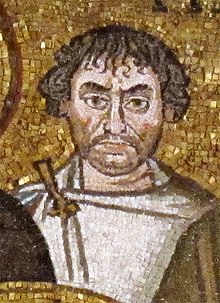Narses
Narses ( ancient Greek Ναρσής ; * around 490 ; † 574 in Rome) was a eunuch and general of the Eastern Roman emperor Justinian .
Life
Narses, an important figure of the late late antiquity , came from so-called Persarmenia , i.e. the part of Armenia occupied by the Sassanids . In contrast to the Eastern Roman Empire, castration was permitted there, which is why the Romans, who believed they had to rely on eunuchs for certain positions at the imperial court, regularly "imported" castrati from this region. It is not known exactly when Narses came to Constantinople . Under Justinian (527 to 565) he was initially primicerius sacri cubiculi (i.e. administrator of the imperial finances). During the Nika uprising in early 532, he gained the trust of the emperor and that of the emperor's wife Theodora through his skillful manipulation of the rebels . In 538, although he was actually a civilian, he went with an army to Italy , where his rival, the magister militum Belisarius , had been fighting the Ostrogoths since 535 . Since the two generals blocked each other, Narses was first recalled, and Belisarius led the war in 540 to a provisional conclusion with the conquest of Ravenna . But when the fighting flared up again since 541, the Eastern Romans of the Goths under their new king Totila could not be master for a long time, as Justinian had to wage a bloody Persian war and could not concentrate on Italy.
Belisarius was eventually recalled and Narses was given a second chance: he was appointed commander in chief of the imperial troops in Italy in 551 . While Belisarius was failed not least from a shortage of soldiers, succeeded Narses to set up a powerful army of over 30,000 men and, bypassing the Gothic positions in the Po Valley invade, in Italy, where he in the summer of 552, the Ostrogoths on the Busta Gallorum (near Gualdo Tadino in Umbria) and in autumn on Mons Lactarius (today Monte Angelo between Naples and Salerno). Totila was killed in the first battle , his successor Teja in the second. An Alemannic-Frankish army under Butilinus , which had invaded Italy at the request of the defeated Ostrogoths, was able to destroy Narses in the autumn of 554 in a decisive battle at Casilinus ; in the same year Narses was commissioned by Justinian to oversee the reconstruction.
In the following years Narses stayed in Italy, consolidated the Eastern Roman rule over the country and tried to restore the infrastructure destroyed by the long war. The building inscription for a new bridge on Via Salaria from 565 (ILS 832) has been preserved. In it, the vir gloriosissimus and patricius Narses can be celebrated as victor over the tyrannus Totila: "Everywhere echoing may the applause praise Narses, who broke the stubborn spirit of the Goths and taught rivers to bear the hard yoke". At the beginning of 568, however, he fell out of favor with the new emperor Justin II - apparently the “remnants” of the western senate aristocracy had complained about him because of his rigid financial policy - and was recalled, but he stayed in Italy, where he later died very old.
Whether, as some late sources claim, Narses actually called on the Lombards to invade Italy in revenge on the emperor is questionable. It is conceivable, however, that behind the news there is a failed project: Perhaps the Lombards were originally supposed to be settled in the Po Valley as imperial federates to protect the country from the Franks. A similar plan had been pursued at least in 540; at that time this role was intended as a buffer for the Goths. In any case, Narses was evidently about to go to Constantinople when the news of the Lombard invasion reached him; he tried to organize the Eastern Roman defense - albeit with limited success. The Lombards conquered upper and parts of central Italy; the Longobard Empire continued until it was conquered by Charlemagne in 774.
literature
- Dariusz Brodka: Narses. Politics, war and historiography in the 6th century AD Peter Lang, Berlin 2018, ISBN 978-3-631-76122-9 .
- Neil Christie: Invasion or invitation? The Lombard occupation of Northern Italy. In: Romanobarbarica. Vol. 11, 1991, ZDB -ID 199289-2 , pp. 79-108.
- Adolf Lippold : Narses 13a). In: Paulys Realencyclopadie der classischen Antiquity Science (RE). Supplementary volume XII, Stuttgart 1970, Col. 870-889.
- Arnold HM Jones , John R. Martindale, John Morris : The Prosopography of the Later Roman Empire . Volume 3: John R. Martindale: AD 527-641. Volume B: Kâlâdji - Zudius. Cambridge University Press, Cambridge et al. 1992, ISBN 0-521-20160-8 , pp. 912-928.
| personal data | |
|---|---|
| SURNAME | Narses |
| BRIEF DESCRIPTION | Protector and general of the Byzantine emperor Justinian I. |
| DATE OF BIRTH | at 490 |
| DATE OF DEATH | 574 |
| Place of death | Rome , Byzantine Empire |
